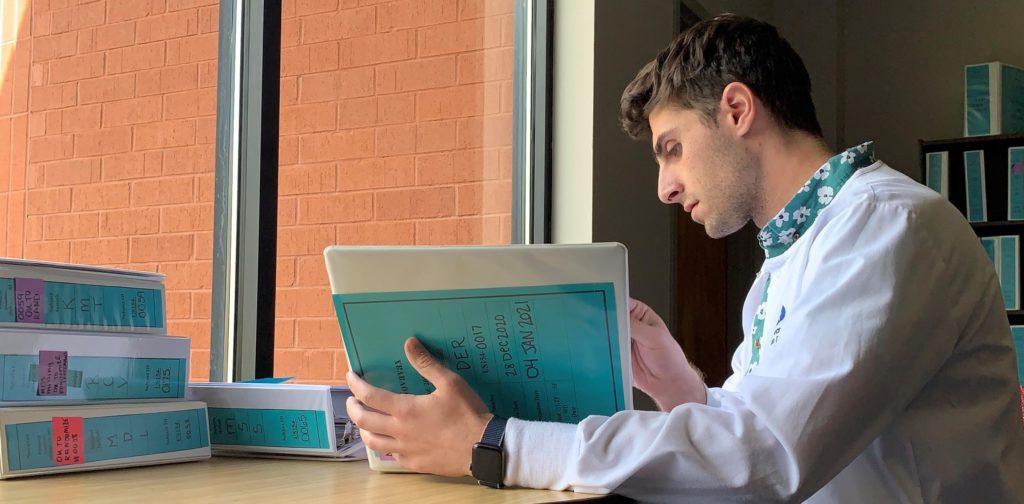
The UMES School of Pharmacy utilizes a three-year, year-round, modular curriculum. The goal of the curriculum in the UMES School of Pharmacy is to offer a professional program which prepares students to acquire the knowledge, and develop the skills and attitudes required to earn the Doctor of Pharmacy degree. Graduates will be entrusted to deliver contemporary person-centered care through the use of the Pharmacists’ Patient Care Process. Foundational knowledge of medications and pharmacy practice, public health, cultural and structural humility, patient safety, evidence-based medicine, and comprehensive medication management are emphasized. The graduates will be prepared to meet the requirements for licensure in Maryland, Delaware and Virginia, and to serve the needs of the Delmarva Peninsula.
All students in the Doctor of Pharmacy program will be required to complete a minimum of 160 credit hours.
The first two academic years (SP-1 and SP-2 years) will consist of a combination of required modular (block) and longitudinal didactic courses completed in-person on the UMES campus. A four-course Skills Lab sequence run simultaneously with the integrated block courses during each of the first two years to ensure reinforcement of knowledge and development of essential skills and entrustable professional activities. Each of the first four semesters also includes an Introductory Pharmacy Practice Experiences (IPPE) completed in conjunction with an approved practice site overseen by a credentialed preceptor.
During the third year (SP-3) of the program, students complete 40 credit hours of Advanced Pharmacy Practice Experiences (APPEs). Each APPE course is a full-time, 40 hours/week, supervised rotation that is 5 weeks in duration, providing 5 credits and 200 hours towards pharmacist licensure. Students must complete four required APPE rotations in advanced community, advanced institutional, acute care, and ambulatory care practice. The remaining four APPE rotations can be selected from among various electives, with at least one patient care elective and one systems elective. The final year of the curriculum also includes two longitudinal courses (PHRM795 and PHRM796) that are designed to prepare students for the transition to independent pharmacy practice and will be taken concurrently with the APPE rotations.
| First Academic Year Fall | Credits | First Academic Year Spring | Credits |
| PHRM 501 Foundations of Biomedical Sciences I | 5.0 | PHRM 531 Foundations of Pharmaceutical Sciences II | 4.5 |
| PHRM 502 Foundations of Biomedical Sciences II | 4.5 | PHRM 601 Principles of Pharmacotherapy | 5.5 |
| PHRM 530 Foundations of Pharmaceutical Sciences I | 5.0 | PHRM 610 Integrated Biomedical & Clinical Sciences I: Neurology & Psychiatry | 6.0 |
| PHRM 540 Pharmacy Administration I | 3.0 | PHRM 543 Public Health for Pharmacists | 2.0 |
| PHRM 542 Concepts in Diversity and Communication for the Pharmacist | 3.0 | PHRM 562 Professional Development II | 1.0 |
| PHRM 550 Pharmaceutical Calculations | 2.0 | PHRM 609 Therapeutics of Self Care and Over-The- Counter Products | 2.0 |
| PHRM 561 Professional Development I | 1.0 | PHRM 650 Top 200 Drugs | 1.0 |
| PHRM 571 IPPE Introductory Community or PHRM 572 IPPE Introductory Institutional | 3.0 | PHRM 571 IPPE Introductory Community or PHRM 572 IPPE Introductory Institutional | 3.0 |
| PHRM 590 Skills Lab I | 3.0 | PHRM 591 Skills Lab II | 3.0 |
| Electives | 0.0-6.0 | ||
| Total Semester Credits | 29.5 | 28.0-34.0 | |
| Total Academic Year Credits | 57.5 – 63.5 | ||
| Second Academic Year Fall | Credits | Second Academic Year Spring | Credits |
| PHRM 611 Integrated Biomedical & Clinical Sciences II: Pulmonary & Nephrology | 5.5 | PHRM 614 Integrated Biomedical & Clinical Sciences V: Hematology, Immunology, & Oncology | 6.0 |
| PHRM 612 Integrated Biomedical & Clinical Sciences III: Cardiology | 5.5 | PHRM 615 Integrated Biomedical & Clinical Sciences VI: Infectious Diseases | 6.5 |
| PHRM 613 Integrated Biomedical & Clinical Sciences IV: Endocrinology & Gastroenterology | 6.0 | PHRM 616 Integrated Biomedical & Clinical Sciences VII: Geriatrics, Pediatrics, Urology, & Special Considerations in Pharmacotherapy | 4.0 |
| PHRM 640 Pharmacy Administration II | 3.0 | PHRM 645 Pharmacy Law and Ethics | 2.0 |
| PHRM 661 Professional Development III | 1.0 | PHRM 646 Informatics and Telehealth | 2.0 |
| PHRM 671 IPPE Direct Patient Care I | 2.0 | PHRM 662 Professional Development IV | 1.0 |
| PHRM 690 Skills Lab III | 3.0 | PHRM 672 IPPE Direct Patient Care II | 2.0 |
| PHRM 691 Skills Lab IV | 3.0 | ||
| Electives | 0.0-6.0 | Electives | 0.0-6.0 |
| Total Semester Credits | 26.0-32.0 | 26.5-32.5 | |
| Total Academic Year Credits | 52.5 – 58.5 | ||
| Third Academic Year Fall | Credits | Third Academic Year Spring | Credits |
| PHRM 795 Transitions to the Pharmacy Profession I | 2.0 | PHRM 796 Transitions to the Pharmacy Profession II | 2.0 |
| Advanced Practice Pharmacy Experiences (APPEs) | |||
| Required | Credits | Electives | Credits |
| PHRM 700 APPE-Advanced Community | 5.0 | APPE Patient Care Electives | 5.0 each x 4 = 20.0 |
| PHRM 701 APPE-Advanced Institutional | 5.0 | PHRM 715 APPE – Patient Care | |
| PHRM 702 APPE- Acute Care | 5.0 | APPE Systems Electives | |
| PHRM 703 APPE- Ambulatory Care | 5.0 | PHRM 720 APPE – General Elective | |
| Total Semester Credits | 17.0-27.0 | 17.0-27.0 | |
| Total Academic Year Credits | 44.0 | ||
| Total Program Credits | 160.0 | ||


